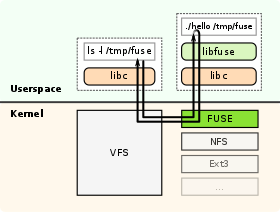Filesystem in Userspace
From Wikipedia, the free encyclopedia
 A flow-chart diagram which shows how FUSE works |
|
| Latest release | 2.7.4 / 2008-07-25 |
|---|---|
| Written in | C |
| OS | Unix-like |
| Type | File system driver |
| License | The kernel part GPL and Libfuse under LGPL. |
| Website | http://fuse.sourceforge.net/ |
Filesystem in Userspace (FUSE) is a loadable kernel module for Unix-like computer operating systems, that allows non-privileged users to create their own file systems without editing the kernel code. This is achieved by running the file system code in user space, while the FUSE module only provides a "bridge" to the actual kernel interfaces. FUSE was officially merged into the mainstream Linux kernel tree in kernel version 2.6.14.
FUSE is particularly useful for writing virtual file systems. Unlike traditional filesystems, which essentially save data to and retrieve data from disk, virtual filesystems do not actually store data themselves. They act as a view or translation of an existing filesystem or storage device. In principle, any resource available to FUSE implementation can be exported as a file system. See Examples for some of the possible applications.
Released under the terms of the GNU General Public License and the GNU Lesser General Public License, FUSE is free software. The FUSE system was originally part of A Virtual Filesystem (AVFS), but has since split off into its own project on SourceForge.net.
FUSE is available for Linux, FreeBSD, NetBSD (as PUFFS), OpenSolaris and Mac OS X.
Contents |
[edit] Examples
- ExpanDrive: A commercial filesystem implementing SFTP/FTP/FTPS using FUSE
- GlusterFS: Clustered Distributed Filesystem having capability to scale up to several petabytes.
- SSHFS: Provides access to a remote filesystem through SSH
- GmailFS: Filesystem which stores data as mail in Gmail
- EncFS: Encrypted virtual filesystem
- NTFS-3G and Captive NTFS, allowing access to NTFS filesystems
- WikipediaFS : View and edit Wikipedia articles as if they were real files
- Sun Microsystems's Lustre cluster filesystem will use FUSE to allow it to run in userspace, so that a FreeBSD port is possible. [1] However, the ZFS-Linux port of Lustre will be running ZFS's DMU (Data Management Unit) in userspace. [2]
- archivemount
- LoggedFS[1]: Logging of file system access
- HDFS: FUSE bindings exist for the open source Hadoop distributed filesystem.
- mtpfs: mounting MTP devices like Creative Zen music players
( more in the references section)
[edit] See also
[edit] References
- ^ "Lustre FreeBSD". http://lustre.sev.net.ua/. Retrieved on 2008-03-02.
- ^ "Architecture ZFS for Lustre". Sun Microsystems. http://arch.lustre.org/index.php?title=Architecture_ZFS_for_Lustre. Retrieved on 2008-03-02.

